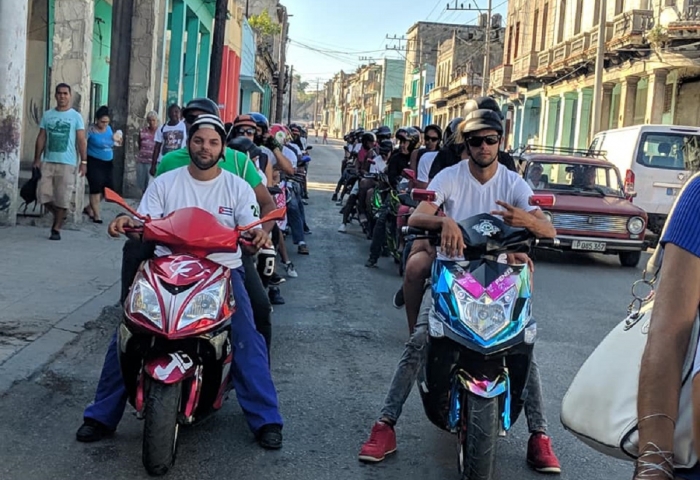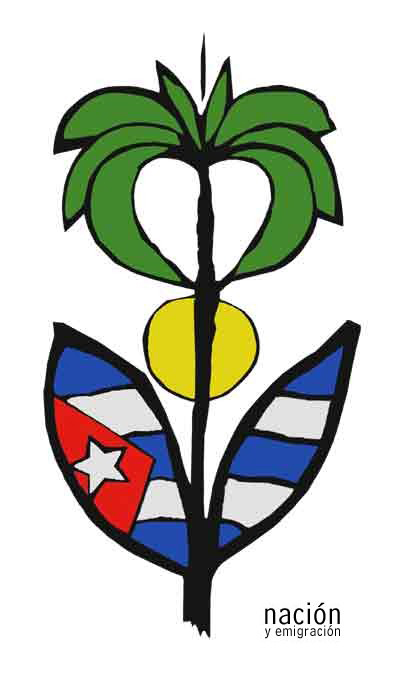Cubans in the UK reject escalation of Trump's sanctions against Cuba
- Detalles
- Publicado: Martes, 05 November 2019 20:28
Letter sent to Christopher Pincher MP

Electric Motorcycle Club gives a lift to passengers waiting for busses in Havana.
The Rt. Hon Christopher Pincher MP
Minister of State for Europe and the Americas
Office of Christopher Pincher MP
The Whitehouse, 93 Lichfield Street
Tamworth , B79 7QF
1 November 2019
Dear Rt Hon Christopher Pincher MP
For almost 60 years we Cubans have suffered the effects of sanctions by the United States, sanctions known as an embargo or blockade. The damages accumulated during almost six decades of the application of this policy have reached the figure of $922.6 billion.
The current administration of President Donald Trump has tightened the blockade against Cuba.
This year, 2019, announcements and enforcement of new sanctions against Cuba have escalated; these are allegedly aimed at the government and the Communist Party. The facts show that the blockade continues to cause serious problems for the economy and the Cuban people.
- This year the list of sanctioned Cuban entities has increased.
- Title III of the Helms-Burton Act entered into force.
- General licenses for ‘people to people’ educational trips were eliminated
- Licenses to non-commercial aircraft and passenger and recreational vessels on temporary stays were withdrawn, which includes the arrival of cruises to Cuba.
- Visas were denied for a Cuban medical delegation to attend a meeting of the Pan American Health Organization (PAHO) in Washington
- Persecution and sanctions on vessels owned by Venezuelan oil company PDVSA, and other foreign insurance companies and ships that transport oil and fuels to Cuba.
- Fines to banks and third-country entities for making transactions and financial operations related to Cuba.
- Blocking social media accounts of Cuban government representatives and media.
- The Bureau of Industry and Security (BIS) of the US Department of the Treasury announced new amendments to the Regulations for Export Administration (EAR), which aim to further restrict exports and re-exports of goods to Cuba. Among them, a general policy of refusal of licenses for the lease of aircraft to Cuban state airlines is established.
- Suspension of all flights from the US to destinations in Cuba, with the exception of Havana. This will make it difficult for Cuban-Americans to visit their families on the island.
The US government justifies the imposition of sanctions under the pretext of the alleged repression of the Cuban people by the government and its support for the ‘regime’ of Maduro in Venezuela. On several occasions, the US administration has accused Cuba of having 20,000 military and security personnel in Venezuela, referring to Cuban doctors in white coats who have earned the respect and love of the communities and neighborhoods of Venezuela where they provide medical care, as in other corners of the world.
The blockade is a policy disguised as ‘humanitarian aid’ that seeks to change the regime in Cuba. It is an inhuman and punitive policy that punishes the most vulnerable within the Cuban society. In recent days we watched on television as a group Cuban children participated in an awareness campaign to promote energy saving in their communities. These children will grow up as the victims of this brutal policy. From Great Britain we have known old people, teenagers, women, disabled people, sick people who have struggled with transport because of recent oil shortages caused by the US blocking the entrance of fuels into the country. Through this repression and economic strangulation, the US government is clearly committed to creating chaos and despair among Cubans, in order to obtain political concessions. Despite these difficulties imposed on them, the Cuban people are responding to the sanctions with more solidarity, sensitivity and spirit of resistance to adversities. The Cuban government has not cut social benefits, there have been no anti-government demonstrations, curfews, or military or police repression of the people. Unlike other countries in Latin America with governments allied to the US where the police and the military have harshly repressed thousands of protesters claiming their rights and social benefits, taken away by right-wing governments and neo-liberal packages promoted from the US.
On multiple occasions the British government has made clear its rejection of the US embargo. Including in the United Nations, voting in favor of the resolution presented by Cuba every year on the ‘need to end the economic, commercial and financial blockade imposed by the United States of America against Cuba’. We hope this support will be maintained.
The blockade not only affects Cubans residing in Cuba, but also all Cubans living outside of Cuba or any citizen in third countries. In Britain the financial sector continues to ignore the position of the British Government and the regulations in force that prohibit the extraterritorial implementation of the blockade, for fear of being fined by the OFAC of the US Department of the Treasury.
The British bank HSBC continues to threaten the closure of our community account if we do not accept the OFAC regulations regarding the blockade of Cuba, something illegal according to British regulations. That is why we ask the British government to enforce current regulations that prohibit the extraterritorial application of the blockade in the United Kingdom. Specifically, Decree No. 3171 approved in 1996, related to the ‘Protection of commercial interests’ on the extraterritorial legislation of the United States of America. That legislation grants the British government the power to penalise legal and natural persons who make use of US legislation in British territory, as a measure of counteracting its effects.
Cubans in the UK strongly reject the new escalation of Trump administration sanctions against Cuba.
We wait your answer.
Thanks in advance.
Daniesky Acosta
Director, Cubans in the UK






